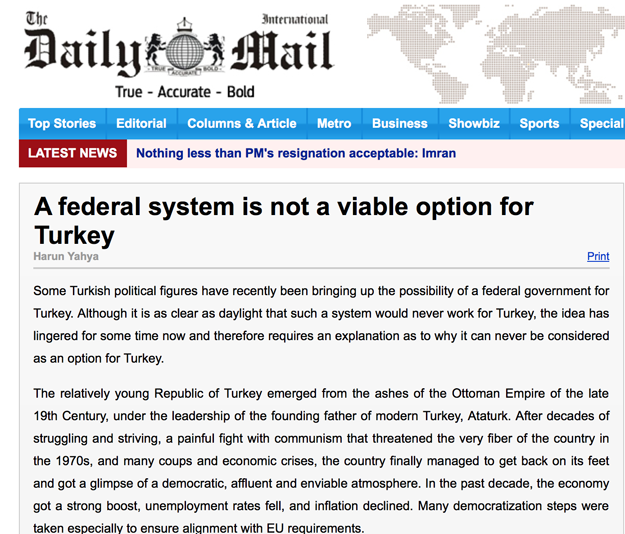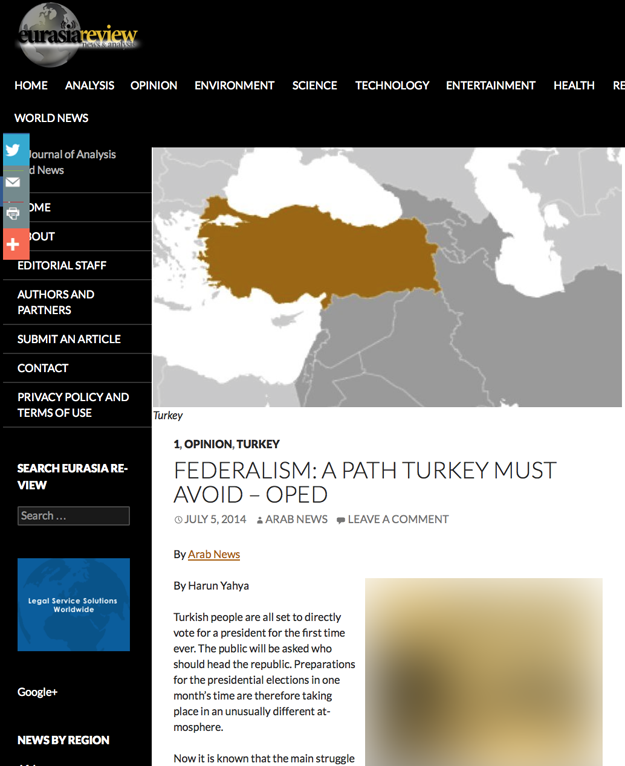

Some Turkish political figures have recently been bringing up the possibility of a federal government for Turkey. Although it is as clear as daylight that such a system would never work for Turkey, the idea has lingered for some time now and therefore requires an explanation as to why it can never be considered as an option for Turkey.
The relatively young Republic of Turkey emerged from the ashes of the Ottoman Empire of the late 19th Century, under the leadership of the founding father of modern Turkey, Ataturk. After decades of struggling and striving, a painful fight with communism that threatened the very fiber of the country in the 1970s, and many coups and economic crises, the country finally managed to get back on its feet and got a glimpse of a democratic, affluent and enviable atmosphere. In the past decade, the economy got a strong boost, unemployment rates fell, and inflation declined. Many democratization steps were taken especially to ensure alignment with EU requirements.
However not everything was so smooth. The PKK terrorist organization, which has been fighting against the Turkish state for the past 30 years, claiming more than 30,000 lives in the process, stepped up its efforts to reach its goal. Even though their intention of building a communist state in Southeastern Anatolia with the communist riot they instigated is known by everyone, they tried a different tactic and worked to worm their way into success with smooth talking by promising to leave Turkey with their arms (which not surprisingly, was never honored).
Amidst this background, the country faces another threat: Talks about shifting to a federal government.
Turkey, like many other countries in the world, has to deal with separatist sentiments based on communist and racist ideals. PKK terrorists operating in Southeastern Anatolia wish to break away this part of the country to build a communist Kurdish state based on Leninist ideals. Although they have failed so far in their attempts, shifting to a federal system in these murky waters could dangerously work to the advantage of PKK separatists. Decentralization, and consequently more power in the hand of local governments benefiting from the resources of the state for their separatist agenda, could gradually lead to talks about secession, as this is what the PKK has looked for since their beginning.
First they will pretend that it is just for the good of the country, and after a while, they might offer holding a referendum under UN inspection and with the use of guns to threaten the residents, they can easily guarantee a ‘yes’ vote, followed by attempts of declaration of independence.
Turkey has been home to various ethnic groups for thousands of years which lived side by side peacefully. In addition to Turks and Kurds, Arabs, Greeks, Armenians, the Circassians, the Laz and many other groups co-existed on these lands and flourished together with marriages leading to an unbreakable unity of brotherhood. The people of this country never felt any different towards each other because of their ethnic or other differences. However, the latest separatist attempts at harming this union are playing into ethnic nationalist sentiments. To do this, these people offer a system that accepts and cares for only the people of Kurdish origin, shutting all other ethnicities out. This has reached a stage that is beyond disturbance and has turned out to be a genuine threat against the unitary structure of the state. Neither the Turks nor the Kurds wish to separate from each other based on their rooted togetherness within the lands of Anatolia and the entire region, even though the terrorist PKK wants the world to believe otherwise. However, the PKK neither represents nor cares for the real wishes of the Kurdish people, as their only desire is to build a communist state in the Southeastern part of Turkey. For this very reason, a federal system can never be acceptable for Turkey.
A federal system might work for countries like the USA and Germany, but it is a very dangerous system for countries such as Turkey, if not a trap that would easily lead to separation. This is a scenario we have seen many times in other parts of the world, and every single time, it ended with separation, tears and conflicts.
Racial and ethnic differences are no reason for being separate and divided. As explained above, Turkey has been home to various different ethnic origins for centuries and trying to divide them on the basis of so-called ethnic differences would mean breaking apart an intact body which would not work, other than being seen as a poor political excuse.
Both Turkish people and Kurdish people are devout Muslims and see each other as brothers and sisters. To them, ethnic differences bear no weight as Islam clearly tells them that such differences do not matter and superiority is found only in closeness to God. Trying to break them apart on the basis of such superficial differences would not work as they are bound by a stronger link that is unbreakable: Islam.
In addition, such a dangerous shift in Turkey would have detrimental consequences not only for this country, but it would also disturb the sensitive balances of the whole Middle East. It could create an atmosphere of instability and distrust, adding fuel to the fire that is already raging in the region.
Therefore, Turkey should take the safe route and hold on to its current system and seek deeper alliance, unity and solidarity rather than pursue options that would have devastating results.


